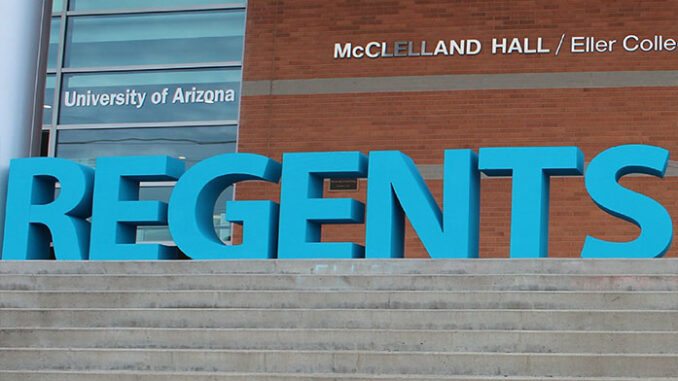
The Big 12 Conference is set to leave its mark on the state of Arizona, as a positive early step was checked off Thursday.
Big 12 commissioner Brett Yormark was in Tempe, speaking to the Arizona Board of Regents at Arizona State University’s Fulton Center. Yormark spoke on the current state of college athletics, highlighting the new-look Big 12 with the addition of several schools, including Arizona State University and the University of Arizona.
The conversation covered a variety of topics embedded in the ever-changing landscape of college athletics, including revenue-sharing, name, image and likeness and expansion. Joined on stage by recently hired athletic directors Desireé Reed-Francois of Arizona and Graham Rossini of ASU, Yormark emphasized his vision for the Big 12 as the conference expands to 16 teams starting this fall.
“I love the market, and it’s always nice to pay a visit here,” Yormark said. “I will say there’s never been a more important time for college athletics than right now … As I see it, (sport) sits at the front porch of every institution for all the right reasons, and it drives the ecosystem across the board.”
Yormark highlighted the conference’s new vision statement, which stresses the Big 12’s commitment to be “the most relevant and nationally recognized conference.” Yormark also emphasized the conference’s dedication to football relevance and affirmed the conference as the “No. 1 basketball conference in America.”
Arizona and ASU will debut representing the Big 12 on Aug. 31 against the University of New Mexico and the University of Wyoming, respectively.
Rossini, hired on May 23, expressed his familiarity and belief in the Big 12 Conference, despite his short tenure in the role. Previously serving as chief business officer for the university, Rossini has been privy to all aspects of the transition that ASU, Arizona, the University of Colorado and the University of Utah have made to the conference.
“I think we’re all getting a taste of the conversations that we’ve been lucky to be a part of for the past several months,” Rossini said. “I’ve had the good fortune of being in the Big 12 meetings for most of this calendar year, and so I’ve been a part of the planning, been a part of these discussions as well, which have been helpful.
“I do think we’re uniquely suited here at ASU with the scale and the strength of this university behind us and all the opportunities in this tremendous market of the Valley, and the Phoenix metropolitan area, to be ahead of the ways that we can connect, we can generate, we can build resources to support our student-athletes.”
Led by ABOR treasurer Lyndel Manson, the board posed a variety of questions centered around how the Big 12 planned on serving its athletes at the Arizona institutions in this new age of college athletics, and understanding the ever-changing landscape of NIL. Manson expressed her encouragement from the event, and hopes tocontinue the dialogue with Arizona schools going forward.
“I think this was one of the best discussions we’ve had in terms of strategic initiatives,” Manson said. “I look forward to more regular conversations with the ADs from all three of our schools just to kind of see where we’re going. A lot of, as I said, dust in the air at the moment, and I’m waiting for a little bit of it to settle.”
Formally serving as athletic director at the University of Missouri, Desireé Reed-Francois was hired by Arizona on Feb. 19. Reed-Francois emphasized the importance of revenue sharing, as the Big 12 announced a record $470 million distributed last Friday.
“As we think about our great state, as we think about our university and our community, the University of Arizona athletics, we bring $260 million in economic impact to Southern Arizona,” Reed-Francois said. “We have a responsibility to compete at the highest levels. Participating in revenue share is part of that responsibility if we’re going to continue to compete at this level.”
Yormark was very detailed in the topics he covered in his presentation, and answered questions with confidence and foresight. As the conference advocates always being “greater than 12,” the Big 12 looks towards its next chapter with 16 teams.
“As we think about the next chapter of collegiate athletics, I would just impress upon all of you not to lean away, but to lean in,” said Yormark. “There hasn’t been, as I said before, a better time than right now for the student-athlete, but I feel the same way for collegiate athletics.”
